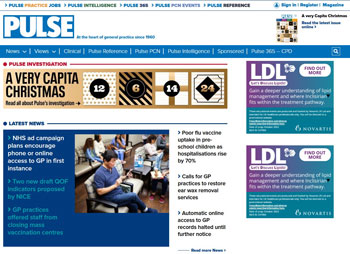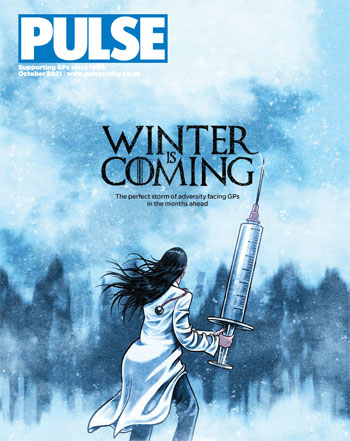
Spend much timing talking to Jaimie Kaffash, Editor of the Year (Business Media) at this year’s PPA Awards, and you can’t help thinking that if there’s one B2B media brand that does what it says on the can, it’s the award-winning healthcare magazine he edits: Pulse.
“Where some magazines see themselves as a critical friend to their readers, Pulse has always been purely a campaigning magazine and unashamedly pro,” Kaffash explains. “When I started at Pulse ten years ago, I saw it was a really different culture.”
Launched in 1960, Pulse is free to healthcare professionals with revenues mainly coming from advertising and events. Its monthly print issue reportedly goes to around 18,000 GPs in their practices UK-wide. Its website attracts an average 1.2 million pageviews each month.
Put together by a full-time team of six, its role is part cheerleader for GPs, part presenting GPs with news and the issues that matter most to them.
And the coming together of this mission with the “contacts-based journalism culture” Kaffash says he was steeped in, having previously covered finance and tax for titles including Accountancy Age, has proven fruitful.
Pulse has undergone a number of significant changes since Kaffash’s arrival, initially working for the title as a freelancer, back in 2012.

“When I arrived, it was weekly,” he recalls. “Over the years since, it went monthly; it was taken over, by health publisher Cogora, after which it went from 120 pages a month down to 50 to 60 – as many titles have done with the growing importance of digital.”
It also began building a reputation for its digital news service, which since the start of the Covid-19 pandemic, has expanded significantly.
In the last three years Pulse has gone from breaking an average of two (news) stories a week online to around three a day – including its scoop seven months into the pandemic that the first Covid vaccination would roll out early that December across the UK.
According to the publishers, pageviews have grown significantly since 2019 – from 5 million in the year before the pandemic to 14 million in 2020 and 19 million in 2021. And this has provided a solid base for a number of recent product launches.
Brand extensions
Shortly before Covid, Pulse launched Pulse Toolkit – a mobile app for GPs offering a comprehensive range of diagnostic and screening tools, and Pulse Intelligence – a digital platform for practices, primary care networks and clinical commissioning groups to help maximise practice income and compare performance against peers.
In the years since, it has launched PulseToday Covid toolkit, Pulse PCN – a forum for Primary Care Network clinical directors that has expanded the brand’s reach and, most recently, Pulse Reference – a one-stop site providing reference sources GPs need for daily GP consultations with content written by GPs and a format designed for GPs.
“Given Covid happened two years into my editorship, it’s hard to separate the pandemic from what I’ve done as an editor,” he readily admits.
“Initially, my approach was to carry on with the good work then carve out new niches. And since becoming editor, that’s been a focus – Pulse PCN, for example, widens our audience among the primary care community.”
New products like Pulse Reference are “all about giving our readers more reasons to come back”, Kaffash adds.
Campaigning role
As an editor eager to meet his readers’ needs, yes, his role involves finding new ways to generate revenue. But as important is continuing Pulse’s tradition of investigations and campaigns which, having lulled during pandemic lockdowns, have – like live events – bounced back recently.
“Investigations are part of a proud history for Pulse. Our journalists love doing them – it’s why you get into journalism, really. Strategically, they underline Pulse’s commitment to campaigning for its readers,” Kaffash explains.
“So, it’s about readership. It’s about traffic. And it’s about our position as being for GPs and our desire to be seen as leading the agenda – we are proud we typically have eight to ten national newspaper front page mentions each year.”
In recent years, since Pulse’s news migrated online, investigations have mainly been for print.
And among Kaffash’s proudest are two recent ones – one demonstrating how the majority of GP practices permanently closed recently were smaller, least well-funded practices in the most deprived areas, the other exposing sexism within the British Medical Association.
Moving forward, he says, the plans are to find ways to make more of Pulse’s investigations online – such as feeding out related content over the course of a week – and, also, to consolidate and build on the recent new products Pulse has launched.
Audience focus
When asked what makes a successful B2B brand, Kaffash, a multi-award-winning editor – among his other awards are PPA Independent Editor of the Year (2021), BSME Editor of the Year (2021), and MJA Editor of the Year (2020) – doesn’t hesitate: it starts with the same thing that makes the foundation of any great editor, he says, and great journalists, too.

“It’s about knowing exactly who your audience is,” Kaffash says. “Everything else as a brand – and as an editor – comes from that. Then after that, it’s about knowing a good story.”
In fact, that’s the appeal and power of B2B.
“Today’s successful media brands are either broad brush brands who cater for the masses, or niche brands – like us – who know their audience spot on. We’re doing pretty well at the moment, but we will get told pretty quickly if we veer off course,” he continues.
A niche readership you can cater for perfectly and specifically is a good place to be.
“The creative thinking that was on show by many during the early months of the pandemic has in many cases strengthened their relationship with their readership – this has certainly been the case of us, and that’s a solid platform to build on moving forward,” he concludes.
Pulse’s clinical advisor, a practising GP working with the team one day a week, “acts like a cheat code for us”, as the title’s “beating heart”, Kaffash says. Feedback from general practice’s front line is critical for Pulse to keep true to its roots: its readers’ best interests.
Managing the editorial team
Kaffash may be an editor, but his heart is still in news. And this influences his perspective on talent which during the pandemic was a major concern.
“Covid-19 has been a major story for Pulse, obviously. And in early 2020, when it took off, we’d just lost two members of staff then were faced by a recruitment freeze.
“My main learning was to look at the team and understand how to move them around in a way that made best use of their skills – for example, moving our features assistant to the news desk.
“A crisis focuses the mind. And I learned: look at your talent. Think how to utilise it for the best. Don’t be restricted by job titles.”
Onboarding new talent during the pandemic has also been a challenge with people working from home.
“It’s made it hard to communicate the culture. Now, we make sure we are all in at least one day a week – some of the younger people more so. And when someone new starts, we make sure they are in the office with someone there with them each day for at least the first week.”
When recruiting, he also tries to take a more pragmatic approach.
“I don’t expect prior healthcare knowledge (when considering editorial job applicants). And it doesn’t have to be about where you trained. It’s all about demonstrable skills, the most important of which is understanding how things affect other people,” he explains.
“When someone shows me a portfolio and it’s full of ‘I’ pieces, my heart drops.
“The main skill you need as a journalist, I think, is an understanding of what matters to your readers, a willingness to pick up the phone, and evidence you’ve put your skills to good practice. Data journalism skills are fantastic, of course, so this may well change.
“But for now, for me, it’s still a lot to do with the old-fashioned skills.”
And the same applies for aspiring editors.
“News always stands you in good stead as an editor,” he believes.
“And an interest in all other aspects of the content – features, views, analysis, of course. Also, editor can be quite a lonely job – no matter how good your team or boss, there are some things that only you can decide. The buck stops with you, as it rightly should.
“If you want to be an editor, you’ve got to bear all this in mind.”
But ultimately, Kaffash reiterates, it’s all about understanding people.
“What matters to your readers should matter to you most,” he says, citing one of the new products he launched recently – the reference tool for GPs that’s a one-stop alternative to the numerous different online sites available – as a case in point.
“Seeing what your readers need is seeing a gap in the market, even if you don’t think of yourself as primarily being ‘commercial’.”
This article was first published in InPublishing magazine. If you would like to be added to the free mailing list to receive the magazine, please register here.












